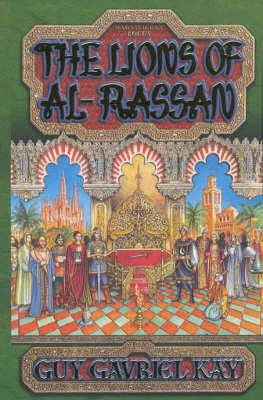Reviewed by Michael @ Knowledge Lost on
The major theme I found in this book was one of religious indifference; the three main kingdoms in this book are actually based on the three major religions, the Kindath, based on the Jews; the Asharites, based on the Muslims; and the Jaddites, based on the Christians. The problem I had with this novel, it becomes incredibly confusing and hard to keep up; you practically have to keep a graph to remember which person is from where and what religion they are based on. I think one of the hardest things with High Fantasy is that all the weird names, races and everything else makes it too confusing.
This is a really complex story and even without the religious metaphors, you still have to have wrap your head around the medical practices of Jehane bet Ishak and all the other physicians in Al-Rassan. As well as military strategies mentioned by Rodrigo Belmonte, Ammar ibn Khairan and King Almalik of Cartada, plus many more overly thought out issues that Guy Gavriel Kay decides to inject into this novel. Luckily this world is the basis of some of his books so while he loves his metaphors, all the world building should translate into his other books.
The world is based around Moorish Spain which helps put the architecture and people’s behaviours into perspective. Even some of the characters are based loosely on Moorish historical figures such as El Cid and Ibn Ammar. Historical fantasy is apparently the genre type for The Lions of Al-Rassan but I cannot say that I have ever heard of this genre type but with a little bit of research I have since found out it is a pretty common sub-genre. Blending elements of the historical into a high fantasy setting and sometimes adding a mystical thread, this genre mixes elements of alternative history but sets it in a completely different world (with common elements); One Thousand and One Nights being the most known novel within the genre.
While this really is not my type of novel, I sometimes felt like the plot was not moving fast enough and other times felt completely lost, The Lions of Al-Rassan somehow managed to keep me. I give full credit to Guy Gavriel Kay’s writing style; the language and the similes helped paint a beautiful scene and overall story. Then the conflict between Jews and Muslims and Christian metaphor was really what interested me the most and kept me going. While fantasy has never been a strong suit for me, it really felt like a template just to explore the author’s thoughts on something so complex and misunderstood as religion. You can see the similarities between the factions and exploring this volatile world from a military strategy perspective really spotlights the political roadblocks that stand in the way for harmony.
This really ended up being something much more than I expected. Proving high literature can be found in any genre. If I had the time and knowledge, I think this would be a great book to pick apart and explore, though that would require deep looks into the theology of the three religions, history of Moorish Spain as well as military strategies. I am sure there must be an academic out there that took the time to look at this book but for me, I just enjoyed my brief visit to the world of Al-Rassan.
This review originally appeared on my blog; http://literary-exploration.com/2013/04/10/book-review-the-lions-of-al-rassan/
Reading updates
- Started reading
- 27 February, 2013: Finished reading
- 27 February, 2013: Reviewed
